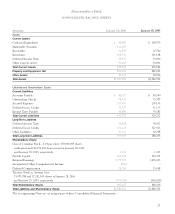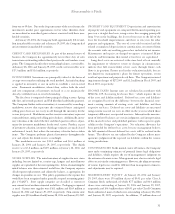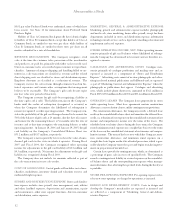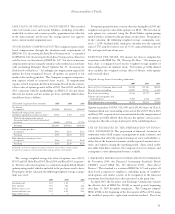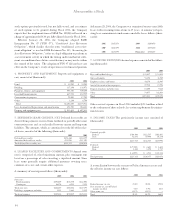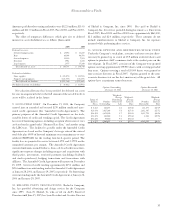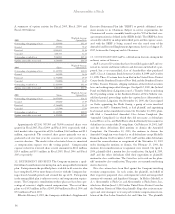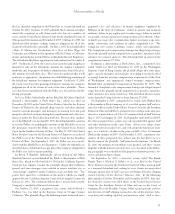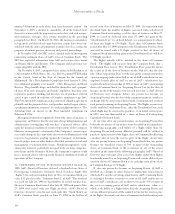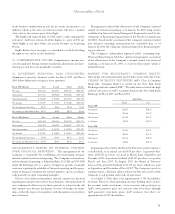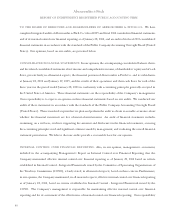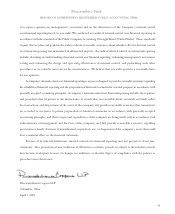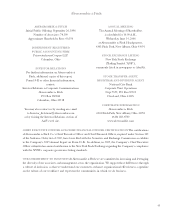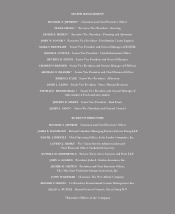Abercrombie & Fitch 2005 Annual Report Download - page 39
Download and view the complete annual report
Please find page 39 of the 2005 Abercrombie & Fitch annual report below. You can navigate through the pages in the report by either clicking on the pages listed below, or by using the keyword search tool below to find specific information within the annual report.
Abercrombie &Fitch
37
filed an amended complaint to add Scott Oros as a named plaintiff on
October 28, 2004. On June 17, 2005, plaintiffs filed a motion to further
amend the complaint to add claims under the laws of a number of
states, and the United States District Court for the Southern District of
Ohio granted that motion on November 8, 2005. On June 24, 2005, the
defendants filed motions seeking summary judgment on all of the
claims of each of the three plaintiffs. On July 1, 2005, the plaintiffs filed
a Rule 23 Motion for Certification of a Class of State Wage Act
Claimants and a Motion for Designation of FLSA Claims as Collective
Action and Authority to Send Notice to Similarly Situated Employees.
The defendants filed their opposition to both motions on December 8,
2005. On March 27, 2006, the Court issued an order indicating that it
intended to rule on the defendants’ motions for summary judgment
forthwith and, for purposes of docket administration, denied the plan-
tiffs motions to certify their class. The Court also indicated that it will
reactivate, as appropriate, the motions to certify following resolution of
the defendants’ motions for summary judgment. On March 31, 2006,
the Court issued an order granting defendants’ motions for summary
judgment on all of the claims of each of the three plaintiffs. These
cases have been consolidated with the Fuller case described in the fol-
lowing paragraph.
In Casey Fuller, Individually and on Behalf of All Others Similarly
Situated v. Abercrombie & Fitch Stores, Inc., which was filed on
December 28, 2004 in the United States District Court for the Eastern
District of Tennessee, the plaintiff alleges that he and other similarly
situated assistant managers and managers in training were not paid
properly calculated overtime during their employment and seeks over-
time pay under the Fair Labor Standards Act. Because of its similari-
ties to the Mitchell case, on April 19, 2005, the defendant filed a motion
to stay the Fuller case pending the outcome of the Mitchell case or, in
the alternative, transfer the Fuller case to the United States District
Court for the Southern District of Ohio. On May 31, 2005, the United
States District Court for the Eastern District of Tennessee transferred
the Fuller case to the United States District Court for the Southern
District of Ohio. On September 2, 2005, the Fuller case was consoli-
dated with the Mitchell case for all purposes. Unlike the Mitchell case
described above, defendants have not moved for summary judgment in
the Fuller case and it remains pending.
In Bryan T. Kimbell, Individually and on Behalf of All Others
Similarly Situated and on Behalf of the Public v. Abercrombie & Fitch
Stores, Inc., which was filed on July 10, 2002 in the California Superior
Court for Los Angeles County, the plaintiffs alleged that California
general and store managers were entitled to receive overtime pay as
“non-exempt” employees under California wage and hour laws. The
parties have agreed to a settlement of this matter, which was finally
approved by the California Superior Court for Los Angeles County on
January 12, 2006. The settlement did not have a material effect on the
Company’s consolidated financial statements.
On October 25, 2005, a purported class action, styled Gibson v.
Hollister Co., was filed in the Superior Court of Orange County,
California. The plaintiff alleges the following claims for herself and a
purported class and subclasses of hourly employees employed by
Hollister in the State of California: failure to provide and maintain
uniforms; failure to pay regular and overtime wages; failure to provide
rest periods and meal periods or compensation in lieu thereof; failure
to timely pay wages due at termination; failure to itemize wage state-
ments; conversion; and violation of unfair competition law. The
Complaint cites various California statutes, orders and regulations.
The Complaint seeks compensatory damages for alleged unpaid wages
due to the plaintiff and the purported class, penalties, injunctive relief,
attorneys’ fees, interest and costs. The defendant filed an answer to the
complaint on January 25, 2006.
In Eltrich v. Abercrombie & Fitch Stores, Inc., a purported class
action which was filed on November 22, 2005 in the Washington
Superior Court of King County, the plaintiff alleges that store man-
agers, assistant managers and managers in training were misclassified
as exempt from the overtime compensation requirements of the State
of Washington, and improperly denied overtime compensation.
Plaintiff filed an Amended Complaint on November 30, 2005. The
Amended Complaint seeks compensatory damages for alleged unpaid
wages due to the plaintiff and the purported class, penalties, injunctive
relief, attorneys’ fees, interest and costs. The defendant filed an answer
to the Amended Complaint on or about January 27, 2006.
On September 2, 2005, a purported class action, styled Robert Ross
v. Abercrombie & Fitch Company, et al., was filed against A&F and cer-
tain of its officers in the United States District Court for the Southern
District of Ohio on behalf of a purported class of all persons who pur-
chased or acquired shares of Class A Common Stock of A&F between
June 2, 2005 and August 16, 2005. In September and October of 2005,
five other purported class actions were subsequently filed against A&F
and other defendants in the same Court. All six cases allege claims
under the federal securities laws, and seek unspecified monetary dam-
ages, as a result of a decline in the price of A&F’s Class A Common
Stock in the summer of 2005. On November 1, 2005, a motion to con-
solidate all these purported class actions into the first-filed case was
filed by some of the plaintiffs. A&F joined in that motion. On March
22, 2006, the motions to consolidate were granted, and these actions
(together with the federal court derivative cases described in the follow-
ing paragraph) were consolidated for purposes of motion practice, dis-
covery and pretrial proceedings.
On September 16, 2005, a derivative action, styled The Booth
Family Trust v. Michael S. Jeffries, et al., was filed in the United
States District Court for the Southern District of Ohio, naming A&F
as a nominal defendant and seeking to assert claims for unspecified
damages against nine of A&F’s present and former directors, alleging
various breaches of the directors’ fiduciary duty. In the following
three months (October, November and December of 2005), four sim-
ilar derivative actions were filed (three in the United States District
Court for the Southern District of Ohio and one in the Court of
Common Pleas for Franklin County, Ohio) against present and for-
mer directors of A&F alleging various breaches of the directors’ fidu-
ciary duty and seeking equitable and monetary relief. A&F is also a


